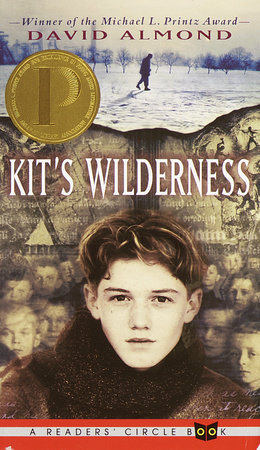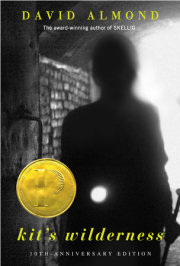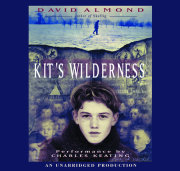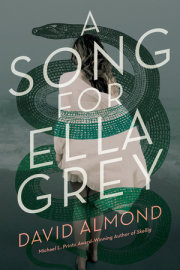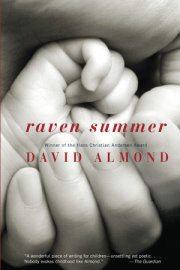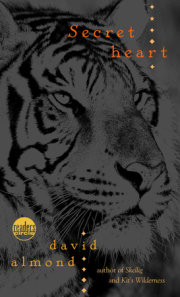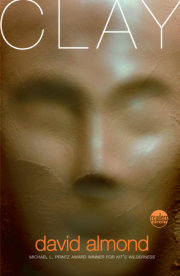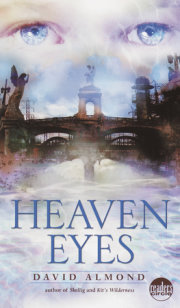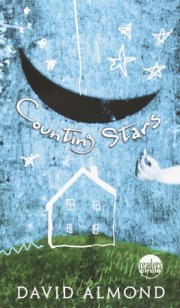1
In Stoneygate there was a wilderness. It was an empty space between the houses and the river, where the ancient pit, the mine, had been. That's where we played Askew's game, the game called Death. We used to gather at the school's gates after the bell had rung. We stood there whispering and giggling. After five minutes, Bobby Carr told us it was time and he led us through the wilderness to Askew's den, a deep hole dug into the earth with old doors slung across it as an entrance and a roof. The place was hidden from the school and from the houses of Stoneygate by the slope and by the tall grasses growing around it. The wild dog Jax waited for us there. When Jax began to growl, Askew drew one of the doors aside. He looked out at us, checked the faces, called us down.
We stumbled one by one down the crumbling steps. We crouched against the walls. The floor was hard-packed clay. Candles burned in niches in the walls. There was a heap of bones in a corner. Askew told us they were human bones, discovered when he'd dug this place. There was a blackened ditch where a fire burned in winter. The den was lined with dried mud. Askew had carved pictures of us all, of animals, of the dogs and cats we owned, of the wild dog Jax, of imagined monsters and demons, of the gates of Heaven and the snapping jaws of Hell. He wrote into the walls the names of all of us who'd died in there. My friend Allie Keenan sat across the den from me. The blankness in her eyes said: You're on your own down here.
Askew wore black jeans, black sneakers, a black T-shirt with "Megadeth" in white across it. He lit a cigarette and passed it round the ring. He passed around a jug of water that he said was special water, collected from a spring that had its source in the blocked-up tunnels of the ancient coal mine far below. He crouched at the center, sharpening his sheath knife on a stone. His dark hair tumbled across his eyes, his pale face flickered in the candlelight.
"You have come into this ancient place to play the game called Death," he whispered.
He laid the knife at the center on a square of glass. He eyed us all. We chewed our lips, held our breath, our hearts thudded. Sometimes a squeak of fear from someone, sometimes a stifled snigger.
"Whose turn is it to die?" he whispered.
He spun the knife.
We chanted, "Death Death Death Death . . ."
And then the knife stopped, pointing at the player.
The player had to reach out, to take Askew's hand. Askew drew him from the fringes to the center.
"There will be a death this day," said Askew.
The player had to kneel before Askew, then crouch on all fours. He had to breathe deeply and slowly, then quickly and more quickly still. He had to lift his head and stare into Askew's eyes. Askew held the knife before his face.
"Do you abandon life?" said Askew.
"I abandon life."
"Do you truly wish to die?"
"I truly wish to die."
Askew held his shoulder. He whispered gently into his ear, then with his thumb and index finger he closed the player's eyes and said, "This is Death."
And the player fell to the floor, dead still, while the rest of us gathered in a ring around him.
"Rest in peace," said Askew.
"Rest in peace," said all of us.
Then Askew slid the door aside and we climbed out into the light. Askew came out last. He slid the door back into place, leaving the dead one in the dark.
We lay together in the long grass, in the sunlight, by the shining river.
Askew crouched apart from us, smoking a cigarette, hunched over, sunk in his gloom.
We waited for the dead one to come back.
Sometimes the dead came quickly back to us. Sometimes it took an age, and on those days our whispering and sniggering came to an end. We glanced nervously at each other, chewed our nails. As time went on, the more nervous ones lifted their schoolbags, glanced fearfully at Askew, set off singly or in pairs toward home. Sometimes we whispered of sliding the door back in order to check on our friend down there, but Askew, without turning to us, would snap,
"No. Death has its own time. Wake him now and all he'll know forever after is a waking death."
So we waited, in silence and dread. In the end, everyone came back. We saw at last the white fingers gripping the door from below. The door slid back. The player scrambled out. He blinked in the light, stared at us. He grinned sheepishly, or stared in amazement, as if emerged from an astounding dream.
Askew didn't move.
"Resurrection, eh?" he murmured. He laughed dryly to himself.
We gathered around the dead one.
"What was it like?" we whispered. "What was it like?"
We left Askew hunched there by the river, strolled back together through the wilderness with the dead one in our midst.
Copyright © 2001 by David Almond. All rights reserved. No part of this excerpt may be reproduced or reprinted without permission in writing from the publisher.

